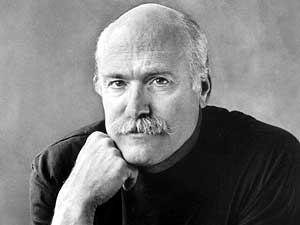Since there has been some emails from a few folks, let me clear up some confusion. I should point out that there are now fifteen shows in various states of completion and undress. Those that are lacking the full summary capsules — that is, those shows that were finished sometime in the last month — can be listened to at the main Segundo site. I have been cross-posting the full shows (with capsules) here at the rate of one new show per day, so as not to overwhelm with content. In addition, there are a few conversations that I have been mastering over the past week that will be finalized soon. When I get past the #220 mark (which should also be very soon), I plan to repack the torrents for those who wish to binge. This is something that requires daily organization amidst many other duties. But I am trying to catch up as quickly as I can. So bear with me.
Author / Edward Champion
The Bat Segundo Show: Tobias Wolff
Tobias Wolff appeared on The Bat Segundo Show #208. Wolff is most recently the author of Our Story Begins.
Condition of the Show: Speculating upon Mr. Wolff’s unknown powers.
Author: Tobias Wolff
Subjects Discussed: Writing first-person stories that don’t seem like first-person stories, the use of the word “I,” contemporary short stories and therapy sessions, fiction and narcissism, William Trevor, knowing the lay of the land, the symbols of the everyday universe, tulle fog, writing endings before the endings, Tolstoy vs. Chekhov, whether “Bullet to the Brain” had any specific literary critic in mind for its premise, dog stories, conversations in cars as the common American confessional, the open road, the consciousness of dogs, straying from realism, stories that end with an italicized line or a whisper, the precise and imprecise details within a sentence, arranging the short story order within a collection, “Best Of” vs. “Selected” stories, psychology and the skillful lack of overt specificity within “The Rich Brother,” hiding a story’s design, Flannery O’Connor, and how Wolff contends with variegated reader reactions.
EXCERPT FROM SHOW:
 Correspondent: This idea of first-person narration that is somewhat removed — maybe this is more of a classical sense of the short story, in the sense that today, contemporary short stories are, as you point out, more of a gushing therapy session. Maybe that’s what we’re talking about.
Correspondent: This idea of first-person narration that is somewhat removed — maybe this is more of a classical sense of the short story, in the sense that today, contemporary short stories are, as you point out, more of a gushing therapy session. Maybe that’s what we’re talking about.
Wolff: Well, I don’t know. Again, when I think, for example, of Philip Roth’s first-person narrators, they are interested in the world at least as much as they are interested in themselves and interested in other people. And that shows up in the narration. It would be a pretty boring story that was so — if I could put it this way — narcissistically defined if you didn’t get a sense of the world beyond the narrator or of other people beyond it. I would think that, unless it was deliberately taking on the pathology of narcissism, it would be a deficiency of the story. Some stories, of course — some first-person stories — rely on a very heavy colloquial. And that may be something that you’re noticing with some of the stories. Like the one I just quoted from, “Next Door,” is quite colloquial. In other stories, you get the sense that the narrator is telling the story not in the immediate moment of the story, but perhaps from a distance. Which also would give you a wider vision of the circumstances and the people involved. And also perhaps a more articulate voice. A more capacious voice. So it isn’t just a Catcher in the Rye, moment-by-moment narration, but something that would open up a little more in the way of Philip Roth or William Trevor. The way their first person stories work.
(A lengthier excerpt from the show can be found here.)
Listen: Play in new window | Download
Roundup
- Dwight Garner and Sam Tanenhaus, the two spineless editors who insult the intelligence of their audience every Sunday at the New York Times Book Review, seem to think that Jay McInerney is somehow a big name. Which is a bit like believing that Robert Palmer is not only still alive, but remains a major fixture on the pop music circuit. Perhaps this strange assignment represents the duo’s dormant adolescent longing to raise spoons to noses and make up for the lost time in which they failed to live. Whatever their motivations, they have enlisted this third-rate oenophile to offer his thoughts about Andre Dubus III’s latest novel. They are under the mistaken impression that McInerney — a smug man so ass-backwards in acumen that he threw in more than two grand to support Giuliani for President — actually has penetrating insight. Alas, McInerney seems less concerned with offering a reasonable assessment, pro or con, of The Garden of Last Days and more fixated upon the novel’s concern for flesh. But any man who writes the sort of laughable sex scenes that Louis Menand rightly ridiculed (“Strange pleas, cries like those of a wounded creature, sounded within her and possibly escaped her lips.”) has no business quibbling with another novelist’s portrayal of carnality. If you’re looking for a sterling example that demonstrates why newspapers are losing readers, look no further than the wizened wizards, no doubt suffering both erectile and phantasmagorical dysfunction, behind the curtain.
- Thankfully, the Washington Post has shown more class. They’ve sent a correspondent to visit Detroit and concluded that it’s all “gritty and romantic.” But there’s no mention of the decayed Michigan Central Station, which leads me to believe that Ms. McCarthy didn’t venture very far. So I’m not sure if Ms. McCarthy truly investigated the real Motortown, much less the seamier side of life. There is perhaps more space devoted to the Frenchmen who discovered the place, as well as its Motown origins. But as mainstream articles go, Ms. McCarthy’s piece represents a slightly unexpected philanthropic nod to Detroit realtors. Let us hope that the next journalistic excursion represents more of the truth. (via The Tomorrow Museum)
- Like Stephen Mitchelmore, I too was astonished to see James Wood begin his Atmospheric Disturbances with a reference to Georg Büchner’s “Lenz.” But it’s the kind of unexpected association that does make Wood a critic that one cannot easily discount. Particularly when Wood has also name-checked Dostoevsky, Knut Hamsun, and Thomas Bernhard.
- Richard Nash points to several video streams of author readings from Bookcourt, including Toby Barlow and Samantha Hunt. To my knowledge, this is the first independent bookstore that has done this. But I hope all bookstores do this, if only so that we can see just how much boilerplate material authors carry on tour.
- J.G. Ballard’s “The Enormous Space” has been adapted by BBC4. (via Splinters)
- Slushpile raises several important questions concerning a new Vince Neil book, but fails to consider why this has-been singer would be given more than $500,000 to “write” a book after the harrowing account known as The Dirt, which opened with the following lacrimal-sensitive sentences, “Her name was Bullwinkle. We called her that because she had a face like a moose. But Tommy, even though he could get any girl he wanted on the Sunset Strip, would not break up with her.” Yes, it’s true that Motley Crue grossed an unfathomable $39.9 million in 2005 concerts (although Neil Diamond grossed $7 million more; the capitalist world is just too cruel). But just how many of these concertgoers, who might have spent their hard-earned money on pleasurable skank weed but opted instead for another silly performance of “Dr. Feelgood,” are pining for a redux? Your faithful correspondent does not possess a Bookscan account, but he beseeches all prospective buyers to truly consider just what they might be wasting their hard-earned dollars upon.
- Has erotica jumped the shark? I don’t believe that anal sex and ménage à trois were ever particularly shocking to me, but then I lived in San Francisco for thirteen years. Nevertheless, Ellora’s Cave publisher Raelene Gorlinsky seems to believe that these two sexual practices have become vanilla, that readers have become acclimated to these forms of titillation, and that the human body can “only do so many things.” While the hunt is now on for more crazed positions and more taboos to be punctured, I find myself more concerned with Ms. Gorlinsky’s dire pronouncements about the body’s apparent limitations. If I am averring these premonitions correctly, this means that I will never have sex again. But since this is perfectly timed with the decline of the American empire (and its Roman comparisons), there is some small solace in knowing that we’ll begin seeing more eunuchs to serve the pleasures of the upper class. (via Smart Bitches)
- A grammarian has died. They’ll be carving tildes into his tombstone and swastikas upon his corpse’s forehead. (via Books, Inq.)
- Splice Today interviews Gaddis expert Steven Moore.
- And I think it’s safe to say that The Atlantic is almost certainly making us stupid. Given contributions from Nicholas Carr, Lori Gottlieb, and B.R. Myers, this is a magazine that has, in the year of our load, 2008, suggested that being sodomized is a more bearable substitute than these insipid articles. I used to be a subscriber. But no more. Scott has more on this.
Where Munich At
America is In Trouble
With Vonnegut and now Carlin gone, the time has come for truthful lacerations. Words that crackle the delicate hides of prissy and solipsistic dispositions and galvanize the collective funny bone. Sentences that radiate the cancer now coruscating within bright neon corporate hellfire. Paragraphs that crack the knees of those fond of calcified postures and unlived lives. I cannot think of a single American satirist under the age of 50 who is willing to go to jail for his words. Jon Stewart and Stephen Colbert are bought by Viacom and look like third-rate Catskills comics next to Chris Morris. Sarah Silverman plays for easily predictable shocks. Howard Stern no longer cares about pissing people off and, with his current Sybian obsession, will end up like Richard Dawson at this rate. Dave Chappelle had it, but abandoned his dais. Amy Sedaris has it, and is braver and more truthful than her brother, but she chooses not to write. Mike Judge has the balls to tell the truth, but his last film, Idiocracy, was dumped by a cowardly studio. Neal Pollack, what happened? This goes on while a cowboy plays his harp at 1600 Penn. If America cannot step up, its cultural salubrity is in serious trouble.
